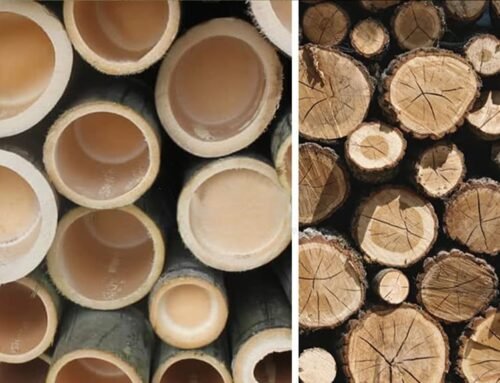How to Choose the Right Freight Forwarder for Importing Bamboo Products from China

Due to the growing environmental consciousness, the demand for sustainable bamboo and rattan furniture is accelerating. Its global market is expected to reach USD 105.36 billion by 2032. (1) China, the largest bamboo cultivator, remains the leading exporter of bamboo products like plywood, veneer, countertops, beams, longboards, crafts, and more. (2)
While the demand is accelerating, the importer or B2B companies face challenges like changing trade terms, compliance issues, and timely delivery. We have discussed them in our previous blog, ‘How to Ship Bamboo Plywood from China to the U.S. Amid Trade Uncertainties.’ Here, we will help you understand how to choose the right freight forwarder so you can navigate the complexities and establish a reliable supply chain network. If you have any doubts, please feel free to talk to our consultants.
Before we begin, let's briefly understand the current trade scenario.
Importing bamboo products from China - Current trade scenario
The trade relations between China and the U.S. have recently seen significant shifts. Fluctuating tariffs and evolving compliance requirements have affected everything, from costs to shipping timelines.
Some of the recent changes that the China-U.S trade has seen are -
- Imposition of various tariffs on goods manufactured in China, including bamboo products.
- Introduction of antidumping practices.
- Significant changes in regulations, thereby increasing the uncertainty for businesses that import bamboo and bamboo products from China.
- Strict compliance with
- Lacey Act - Requires proof of legal sourcing of plants
- HS Code classification - All products require six-digit codes for easy identification during international trade.
- TSCA Title VI - Requires compliance with formaldehyde emission standards.
The regulations for importing bamboo products from China are changing frequently, and keeping track of them could be challenging. That’s why you need a reliable bamboo forwarder who has in-depth knowledge of the trade laws and customs processes related explicitly to bamboo and bamboo products.
Let's look at some key factors you must consider when choosing a freight forwarder.
Key Criteria for Selecting a Freight Forwarder
Here are the top four criteria we at HRT Bamboo recommend to ensure the safe and compliant import of bamboo products.

Relevant industry experience
Shipping bamboo products requires a different approach than shipping video games and toys.
Bamboo plywood and veneer must be wrapped in moisture-resistant packaging to prevent warping and splitting. Bamboo countertops must have edge protection and custom-fit foam padding to prevent chipping. The shipping containers must maintain a relative humidity of 65-70%.
An experienced bamboo forwarder understands the unique needs of these goods. It can guide you through the packaging process and will handle the entire process carefully, including loading, uploading, and container preparation, to ensure your bamboo products reach their destination safely.
Regulatory compliance
A responsible bamboo forwarder must have a thorough and up-to-date understanding of the relevant regulations of both China and the U.S. It should help you streamline the documentation process.
Some of the documents you would need are -
- Commercial invoice
- Packing list
- Bill of Lading
- Sustainability certificates like the FSC certificate
Your freight forwarder should double-check everything to ensure smooth customs clearance and be ready to handle CBP inspections and inquiries if necessary.
Service qualities and capabilities
For hassle-free trade, always work with a bamboo forwarder that offers comprehensive services that cover everything from pickup to delivery.
This could include -
- Door-to-door shipping: This all-inclusive approach makes the freight forward responsible for handling everything, from pickup in China to customs clearance and delivery at the chosen location in the U.S.
- Warehousing - It should be ready to handle warehousing both before and after shipping.
- Modern tracking systems - It should give you access to their tracking system so you can monitor the location and status of your cargo.
- Risk mitigation solutions - A genuine bamboo forwarder often goes the extra mile to minimize your losses. Therefore, it should provide you with the necessary packaging techniques and thoroughly inspect the cargo to ensure everything is as it should be.
- Cargo insurance—A reputable freight forwarder should offer insurance options to cover various hazards associated with bamboo and bamboo products, such as physical damage during transit and pest infestation.
Cost transparency
A reliable bamboo forwarder must provide transparent quotes with no hidden charges. The quote must clearly break down all costs, including tariffs, VAT, documentation charges, handling charges, freight costs, customs clearance fees, insurance premiums, and any other possible costs.
If you import in bulk or frequently, ask your forwarder for bulk discounts and flexible terms.
Once you have made a list of a few bamboo forwarders that meet the above criteria, it's time to dig more about them. Here’s how you can do that.
Evaluating and Comparing Freight Forwarders

Check online reviews
Read their reviews and find out what their clients are saying. Look for repeated complaints and praises. Evaluate their reliability, communication abilities, and efficiency in shipping bamboo products.
Reach out to other businesses that have used their services to inquire about their experience.
Verify their credibility through industry forums.
Some of the trade associations that maintain a directory of accredited freight forwarders are -
- International Federation of Freight Forwarders Associations
- National Customs Brokers & Forwarders Association of America
- American Association of Exporters and Importers
- China International Freight Forwarders Association
Some online communities and marketplaces where you can gather more details about your selected bamboo forwarders are -
Once you have refined your list further, it's time to interview the ones still on your list. Here are a few questions you should ask.
- What specific experience do they have in shipping bamboo products that you want to import?
- Can they provide references to other bamboo product importers who have used their services?
- How do they manage shipment delays and other issues?
- How do they handle custom clearance and compliance?
These are just a few ideas. Feel free to ask any question you have, no matter how silly it sounds.
Once you have selected a freight forwarder, it's time to build a solid relationship with them so they can take good care of your needs. Here are some ideas.
Best Practices for Working with a Freight Forwarder
Communication is key. Ensure you set up a mutually convenient communication channel to get real-time updates. Be honest with your freight forwarder about your requirements and expectations. Openly discuss your concerns to avoid any misunderstandings. In short, do whatever it takes to ensure trust and transparency between you two.
The second thing we at HTR Bamboo recommend is creating Contractual Service-Level Agreements (SLAs). These agreements should be as detailed as possible and cover all important aspects, such as the scope of work, timelines, contingency plans, dispute resolution procedures, and termination conditions. Proper documentation will eliminate guesswork and ensure a smooth operation.
Ask your bamboo forwarder to help you use technology to get the real-time status of your shipment without being dependent on it.
Wrap up
Choosing a freight forwarder to import bamboo products from China can be slightly overwhelming. But don’t rush into the process. Weigh your options properly, and choose someone who is reliable and offers comprehensive services to reduce your hassles.
At HTR Bamboo, we are ready to assist you wherever necessary. If you have any questions, our consultants will be happy to guide you. Contact us today for a free consultation.
Contact us today for a free Quotation!
Share This Story, Choose Your Platform!
Table of Content
Join Our Newsletter
Latest Posts
Copyright 2020 – 2030 Well Nature Bamboo
All Rights Reserved!






